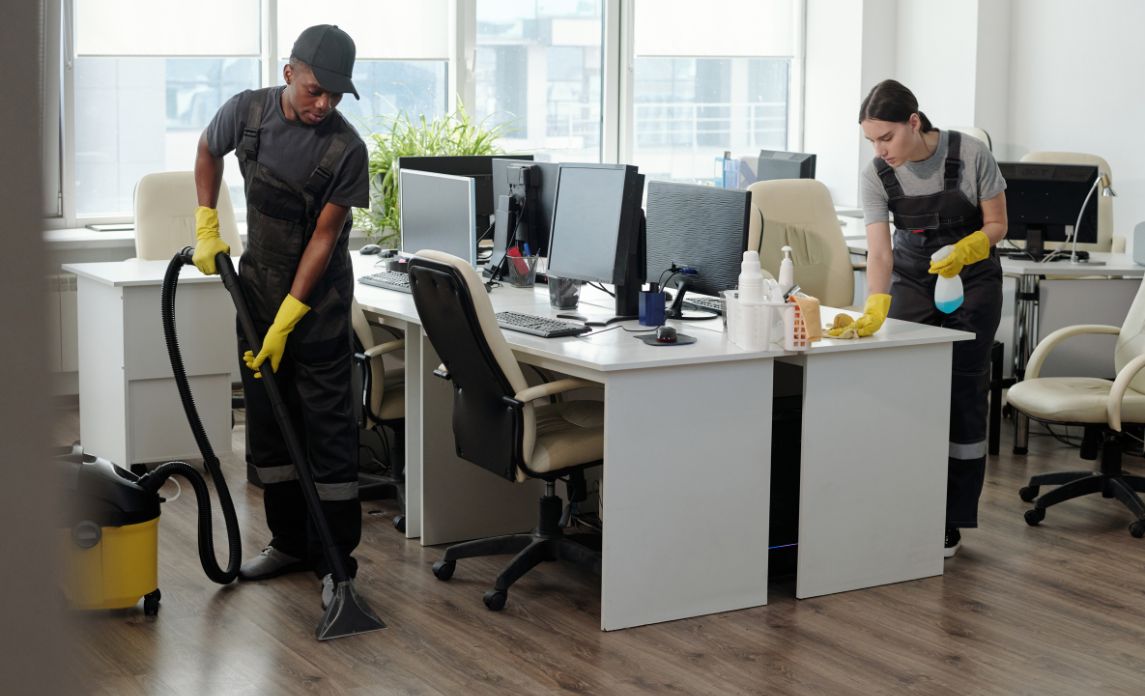Cleaning large spaces—whether it's a commercial building, warehouse, or residential area—requires meticulous planning and efficient execution. Tackling such projects involves overcoming various challenges, from time constraints to logistical complexities. However, with the right strategies in place, managing large-scale cleaning projects can be more manageable and yield satisfying results.
Challenges of Large-Scale Cleaning Projects
While most of the tasks remain the same in large-scale cleaning projects, there are plenty of unique challenges that professional cleaning crews and building managers must contend with. Here are just a few of them:
Time-Consuming Nature
It’s inherently time-consuming to complete large-scale cleaning projects. The sheer size of the area necessitates more time and effort to ensure a thorough job. Thus, it’s vital to allocate sufficient time for each cleaning session and plan strategically to cover the entire space in a timely manner without rushing.
Physical Demands
Cleaning large spaces requires significant physical effort. The office-cleaning company involved in the process must cover expansive zones; many tasks also often involve repetitive movements, lifting heavy objects, reaching high or difficult-to-access areas, and continuous motion. This physical strain can lead to fatigue and necessitates breaks or rotations to prevent exhaustion or injuries.
Logistical Complexity
It can be complex to manage the logistics of a large-scale cleaning project. For example, it can be challenging to coordinate efforts among a team—such as between the professional cleaners and the in-house crew. There may also be issues in ensuring adequate cleaning supplies and equipment for the entire area, as well as organising workflows.
Proper planning and efficient organisation are crucial to ensure that resources are distributed effectively and that the cleaning process runs smoothly.
Detail-Oriented Approach
It’s difficult to maintain consistency and attention to detail throughout the extensive space. There are plenty of spots or areas that you can overlook in large environments, particularly those with multiple floors and rooms.
Achieving uniform cleanliness across the entire space requires careful inspection, methodical cleaning techniques, and a keen eye for detail to ensure no areas are neglected or left uncleaned.
Accessibility and Specific Challenges
Large spaces often include areas that are challenging to access, like high ceilings, narrow or tight corners, or intricate architectural features. Cleaning these areas effectively requires specialised tools, equipment, or techniques to ensure thorough cleaning without compromising safety or quality.
Tips and Strategies to Effectively Clean Large Spaces
While it can be difficult to accomplish large-scale cleaning projects, it isn’t entirely impossible. Below are a few strategies you may want to implement to ensure that all tasks are completed efficiently without compromising quality:
Divide and Conquer
Breaking down the space into manageable sections or zones is crucial for efficient cleaning. Designate specific areas and create a structured plan that outlines tasks for each zone. This approach ensures a systematic and organised cleaning process, allowing individuals or teams to focus on one area at a time for more thorough results.
Establish a Cleaning Schedule
Develop a detailed cleaning schedule that includes specific tasks and timeframes. Also, assign cleaning responsibilities for each day or week, depending on the frequency required. Regular and consistent cleaning routines help maintain cleanliness and prevent the accumulation of dirt and grime in large spaces.
Utilise Proper Equipment and Tools
Invest in high-quality cleaning equipment and tools designed for large-scale spaces, like industrial-grade vacuum cleaners, floor scrubbers, extension poles for high surfaces, and specialised cleaning solutions. Using the right tools can significantly improve efficiency and effectiveness.
Do note that when you hire professional cleaning companies like Crewcare, you don’t have to worry about getting your own cleaning equipment. That said, in certain occasions, you may still need to invest in specialised items (e.g., those needed to clean industry-specific machines) and teach the cleaning crew how to use them.
Implement Technology
Consider using technological advancements such as robotic cleaners, automatic floor scrubbers, or other specialised cleaning equipment tailored for larger spaces. These technologies can cover significant areas efficiently, reducing manual labour and time required for cleaning.
Prioritise High-Traffic Areas
Identify and prioritise cleaning high-traffic zones or areas that receive the most use. These areas often accumulate more dirt and require more frequent cleaning. Regular maintenance of high-traffic areas ensures a cleaner environment and enhances overall hygiene standards.
Delegate Responsibilities
To avoid repeating tasks and ensure efficiency, assign specific tasks to teams or individuals based on their strengths and expertise. Delegating responsibilities ensures that each area receives attention without overwhelming any one person. Effective delegation also streamlines the cleaning process and ensures that all areas are adequately addressed.
Optimise Organisation and Storage
Keep an organised inventory of cleaning supplies and equipment to allow easy access and ensure that things are readily available when needed. Proper organisation minimises downtime and maximises efficiency during the cleaning process.
Regular Maintenance and Spot Cleaning
To address immediate cleaning needs, such as spills or stains, implement routine maintenance schedules. Doing this will prevent minor mishaps from becoming more challenging to clean later. Spot cleaning on a regular basis helps maintain cleanliness and reduces the need for extensive cleaning sessions.
Managing large-scale cleaning projects demands a strategic approach involving proper planning, resource management, and systematic execution. By employing these strategies and tailoring them to fit the specific requirements of the space, individuals and teams can efficiently tackle the challenges and maintain cleanliness effectively in large-scale environments.


